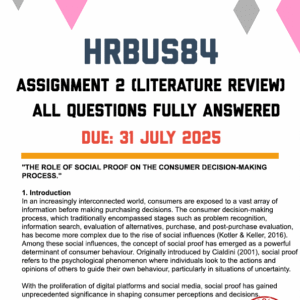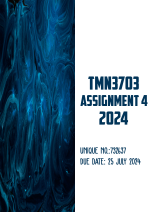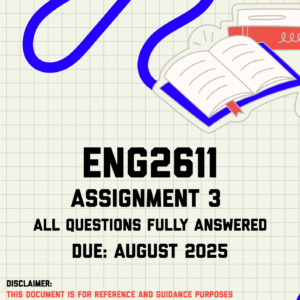Description
DPP1501 Assignment 4 2024 | Due 3 September 2024. All questions answered with references.
Question 1
THEME: PEDAGOGICAL RENEWAL OF TEACHING AND ASSESSMENT PRACTICES
1.1
Please answer the following scenario questions about pedagogical relevance of the knowledge of disabilities.
1.1.1 Scenario 1: You are a teacher in a mainstream classroom with diverse learners, including a student with attention deficit hyperactivity disorder (ADHD), who needs your support as the teacher. How can your knowledge of disabilities be pedagogically relevant in this situation? 5 points x 1 mark = (5)
1.1.2 Scenario 2: In your class, there is a student with dyslexia who struggles with reading and writing. How does your knowledge of disabilities contribute to your pedagogical approach? 5 points x 1 mark = (5)
1.1.3 Scenario 3: A new student with autism has joined your class. How does your understanding of disabilities play a role in creating an inclusive and supportive learning environment? 5 points x 1 mark = (5)
1.1.4 Scenario 4: One of your students has a physical disability that requires the use of assistive devices. How can your knowledge of disabilities be applied to support this student’s participation in various activities? 5 points x 1 mark = (5)
1.1.5 Scenario 5: Your class is discussing a unit on diversity, and you want to ensure that students understand and appreciate differences, including those related to disabilities. How can your knowledge of disabilities contribute to a meaningful and inclusive discussion? 5 points x 1 mark = (5)
[25]
1.2
Explain the meaning of the following concepts, each in a paragraph of approximately six lines.
1.2.2 Curriculum differentiation. (5)
1.2.2 Inclusive learning environment. (5)
1.2.3 Intrinsic barriers to learning. (5)
1.2.4 Extrinsic barriers to learning. (5)
[20]
Question 2
THEME: INFUSE AFRICAN EPISTEMOLOGIES AND PHILOSOPHIES
WITHIN THE PQM
2.1 Read the case study and answer the questions that follow.
CASE STUDY: A Grade 2 teacher talks about her job
My classes are always large and very diverse, so I find that getting to know my learners helps me a lot, not only in terms of how they are doing at school, but also where they come from and how they get on with their peers. I find it is good to know the home environment of your children. Home visits are important because I want the parents to know I’m a human being just like them, a mother who also
needs to deal with problems and who would like to offer support where I can because I care. I always try to be compassionate. I encourage my learners to care and respect one another and we hug one another a lot. During life skills we talk about being special and unique and respecting each other. Sometimes they have worries about things at their homes or in the community so they talk about those things too. The Grade R–3 teachers encourage the children to play games and try to organise regular social activities, for example sports days, fun days and outings. It’s encouraging to see how a ball transcends all forms of barriers. When we play ball games, we all just play together, it is amazing what a ball does.
Teaching a large class can be difficult—it’s tough to find the time to help everyone and sometimes I find I can’t help a learner. It helps that we meet regularly to look at different forms of learning and teaching interventions. We don’t know everything as teachers, so through collaboration we are able to pick up something that has gone wrong in the lesson and confer with one another, otherwise we tend to teach according to our preferred way of learning. I do a lot of peer teaching and I mix my groups so that I always have Sepedi-speakers and English speakers together, which is a way to overcome divisions. My experience is that children become free if they are allowed to speak in their own language rather than always speaking English. They feel safer when they are able to express themselves in Sepedi because sometimes they know the answer but can’t say it in English. We also do Sepedi stories and songs and the Sepedi speakers translate them for the class. Although children come from poor backgrounds, it does not mean they are not capable of learning. Where I can, I try different teaching styles. You see, some learn through association, while others prefer tactile stuff. We do movement forms, music and singing, storytelling, cutting and pasting, puppet work. We sing a song in between, tell a joke, tell a riddle, do some jumps, teaching the tactile child and accommodating the kinaesthetic child. At our school we also have regular workshops with parents to talk about how best to assist learners with language and other learning problems.
(Adapted from: British Council, 2019:96)
Answer the following questions:
2.1.1 Identify two aspects of exclusion from education in this school community.
2×2= (4)
2.1.2 What strategies does the teacher use to support learners and encourage
inclusion? 7 marks x 2 = (14)
2.1.3 In what ways do you think “teaching according to your preferred method of
learning” would be problematic, and how could teacher collaboration help to
prevent this from happening?? 2 marks x 2 = (4)
2.1.4 What impact do you think this teacher would have on learners’ lives? (2)
2.1.5 What are the benefits of involving parents in their children’s schooling through
home visits and workshops? 2 marks x 2 = (4)
2.1.6 Can you suggest additional support that the school community as a whole
could provide? (2)
[30]
Question 3
3.1 Discuss the different types of assessment that can be applied in an inclusive education setting. 4 marks in each case x 5 = (20)
3.1.1
Baseline assessment
3.1.2
Formative assessment
3.1.3
Diagnostic assessment
3.1.4
Summative assessment
3.1.5
Evaluative assessment
3.2
Define the concept “Assessment as learning (Metacognitive Assessment)” with reference to:
3.2.1
Purpose. (2)
3.2.2
Timing (when is it occurring?) (2)
3.2.3
Role or importance of feedback. (1)
[25]
Total = [100]

![IOP2601 Assignment 4 (Complete Answers) Due 27 May 2024- Semester 1/2024 [UNISA]](https://studypass.co.za/wp-content/uploads/2024/05/Screenshot-550-1-300x300.png)












Reviews
There are no reviews yet.